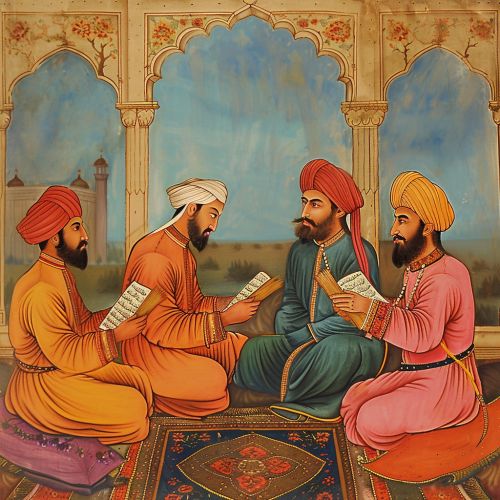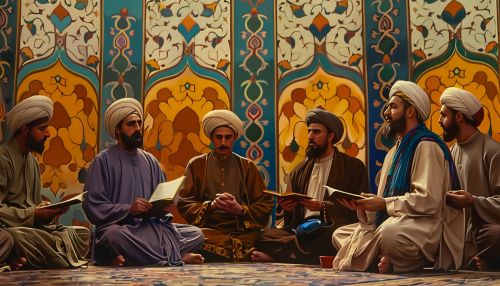Punjabi literature: Difference between revisions
(Created page with "== Introduction == Punjabi literature refers to the literary works written in the Punjabi language, which is spoken by the people of the Punjab region in South Asia, primarily in Pakistan and India. The literature has a rich and diverse history that spans several centuries, encompassing various genres, styles, and themes. It includes poetry, prose, and drama, and reflects the cultural, social, and political milieu of the region. == Historical Background == === Early Per...") |
No edit summary |
||
| (One intermediate revision by the same user not shown) | |||
| Line 9: | Line 9: | ||
The medieval period saw the emergence of Sufi poetry, which played a significant role in shaping Punjabi literature. Prominent Sufi poets like Baba Farid, Shah Hussain, Sultan Bahu, and Bulleh Shah used their poetry to convey spiritual and mystical themes. Their works are characterized by the use of metaphors, allegories, and symbolism, and they often addressed issues of love, devotion, and the human condition. | The medieval period saw the emergence of Sufi poetry, which played a significant role in shaping Punjabi literature. Prominent Sufi poets like Baba Farid, Shah Hussain, Sultan Bahu, and Bulleh Shah used their poetry to convey spiritual and mystical themes. Their works are characterized by the use of metaphors, allegories, and symbolism, and they often addressed issues of love, devotion, and the human condition. | ||
[[Image:Detail-93095.jpg|thumb|center|A depiction of Sufi poets in a traditional setting, reciting poetry.|class=only_on_mobile]] | |||
[[Image:Detail-93096.jpg|thumb|center|A depiction of Sufi poets in a traditional setting, reciting poetry.|class=only_on_desktop]] | |||
=== Colonial Period === | === Colonial Period === | ||
Latest revision as of 23:22, 21 June 2024
Introduction
Punjabi literature refers to the literary works written in the Punjabi language, which is spoken by the people of the Punjab region in South Asia, primarily in Pakistan and India. The literature has a rich and diverse history that spans several centuries, encompassing various genres, styles, and themes. It includes poetry, prose, and drama, and reflects the cultural, social, and political milieu of the region.
Historical Background
Early Period
The early period of Punjabi literature is marked by the oral tradition, where stories, poems, and songs were passed down through generations by word of mouth. One of the earliest known works is the "Janamsakhis," which are hagiographic accounts of the life of Guru Nanak, the founder of Sikhism. These texts provide valuable insights into the socio-religious context of the time.
Medieval Period
The medieval period saw the emergence of Sufi poetry, which played a significant role in shaping Punjabi literature. Prominent Sufi poets like Baba Farid, Shah Hussain, Sultan Bahu, and Bulleh Shah used their poetry to convey spiritual and mystical themes. Their works are characterized by the use of metaphors, allegories, and symbolism, and they often addressed issues of love, devotion, and the human condition.


Colonial Period
The colonial period brought significant changes to Punjabi literature. The introduction of the printing press and Western education led to the proliferation of written works. This period saw the rise of modern Punjabi literature, with writers like Bhai Vir Singh, Puran Singh, and Nanak Singh making substantial contributions. Their works often dealt with themes of social reform, nationalism, and the struggle for independence.
Genres of Punjabi Literature
Poetry
Punjabi poetry is one of the most prominent genres and can be broadly categorized into classical, modern, and contemporary poetry. Classical poetry includes the works of Sufi poets and the "Qissa" tradition, which are epic tales of love and heroism. Modern poetry emerged during the colonial period, with poets like Amrita Pritam and Shiv Kumar Batalvi exploring themes of love, loss, and existential angst. Contemporary poetry continues to evolve, reflecting the changing socio-political landscape.
Prose
Prose in Punjabi literature includes novels, short stories, and essays. The novel as a literary form gained popularity in the 20th century, with writers like Nanak Singh and Gurdial Singh making significant contributions. Their novels often depict rural life, social issues, and the complexities of human relationships. Short stories by writers like Saadat Hasan Manto and Kartar Singh Duggal offer poignant insights into the human psyche and societal norms.
Drama
Punjabi drama has a rich tradition, with roots in folk theatre forms like "Nautanki" and "Bhand Pather." Modern Punjabi drama emerged in the early 20th century, with playwrights like I.C. Nanda and Balwant Gargi addressing contemporary social issues. The genre has continued to evolve, with contemporary playwrights experimenting with new forms and themes.
Themes and Motifs
Punjabi literature is characterized by a wide range of themes and motifs, reflecting the diverse cultural and social fabric of the region. Common themes include love, devotion, social justice, and the human condition. The literature often addresses issues of identity, migration, and the impact of historical events like the Partition of India.
Notable Figures
Baba Farid
Baba Farid is considered one of the earliest and most influential Sufi poets in Punjabi literature. His poetry, known as "Shalokas," is included in the Guru Granth Sahib, the holy scripture of Sikhism. His works emphasize the importance of humility, devotion, and the transient nature of life.
Bulleh Shah
Bulleh Shah is another prominent Sufi poet whose works have had a lasting impact on Punjabi literature. His poetry addresses themes of love, mysticism, and social justice, and often challenges established religious and social norms.
Amrita Pritam
Amrita Pritam is one of the most celebrated modern Punjabi poets and novelists. Her works often explore themes of love, loss, and the female experience. Her novel "Pinjar" is considered a classic and provides a poignant portrayal of the impact of the Partition of India on women.
Influence and Legacy
Punjabi literature has had a profound influence on the cultural and social life of the Punjab region. It has played a crucial role in shaping the region's identity and has contributed to the preservation and promotion of the Punjabi language. The literature continues to evolve, reflecting the changing socio-political landscape and addressing contemporary issues.
